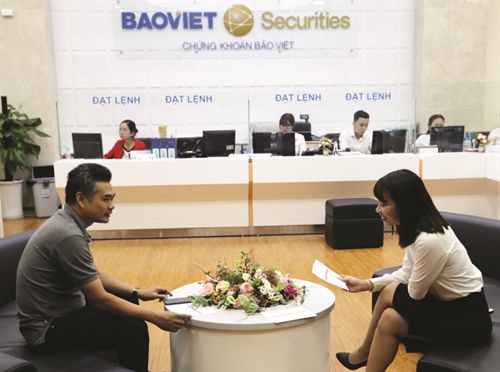The Ministry of Finance (MOF) has recently held a series of conferences to collect opinions from legal experts and stakeholders on the draft Securities Law, focusing on such issues as conditions for acquiring public company status and foreign holding cap in public companies, public offering and private placement of stocks and bonds, powers of the State Securities Commission (SSC), and organizational and operational model of Stock Exchanges.
The 137-article draft, which would replace the 2016 Securities Law and its 2010 amendments, is scheduled to be tabled to the National Assembly for discussion next year.
 |
| A customer inquires information at Bao Viet Securities Joint-Stock Company__Photo: Tran Viet/VNA |
Public company status and foreign holding cap in public companies
With a view to improving the quality of goods on the securities market, the draft law imposes harder conditions for a joint stock company to acquire the public company status. Specifically, the company must have a contributed charter capital amount of at least VND 30 billion, a three-fold increase from the current VND 10 billion. The company must also have at least 20 percent of its charter capital contributed by at least 100 investors other than shareholders holding 1 percent or more of the voting shares.
One of the most significant contents of the draft is the expansion of foreign holding cap in public companies. Accordingly, public companies would be subject to no restrictions on foreign holding cap, unless otherwise prescribed by treaties to which Vietnam has acceded or a specialized law. Particularly, the foreign holding rate in a public company operating in different sectors and subject to different foreign holding caps must not exceed the lowest rate among those prescribed for these sectors.
Foreign holding cap, i.e., the aggregate rate of voting shares and contributed capital amounts owned by foreign investors and economic institutions with foreign investors holding 51 percent or more of charter capital in a public company, securities trading organization, securities investment fund or securities investment company, is not specified in both the 2006 Securities Law and its 2010 amendments. Meanwhile, Decree 60 of 2015 sets out the maximum foreign ownership rate of 49 percent for public companies operating in trades and sectors subject to conditional investment and business but specific foreign holding rate has not yet been prescribed.
The expansion of foreign holding cap would create chance for Vietnamese companies’ stocks to be listed in the MSCI Emerging Markets Index, according to the MOF.
Conditions on public offering and private placement of stocks and bonds
Noteworthily, the draft law lays down different conditions on initial public offering (IPO) and follow-on public offering (FPO) of stocks.
In order to be licensed to conduct an IPO of stocks, an issuing organization must obtain a contributed charter capital of at least VND 30 billion, have been operating at a profit for two consecutive years preceding the year of registration for IPO, and have no accumulative loss. At least 20 percent of its charter capital must be sold to at least 100 investors other than shareholders holding 1 percent or more of the charter capital. The above-mentioned rate would be reduced to 15 percent and 10 percent for those with a charter capital of VND 100 billion or VND 1 trillion or higher, respectively. Additionally, major shareholders must commit to holding together at least 20 percent of the issuing organization’s charter capital for at least one year from the date the IPO is completed.
In case a public company wishes to conduct a FPO of stocks, the total value of additionally issued stocks must not exceed the total value of outstanding stocks, both calculated at par value, unless the company manages to obtain a firm underwriting commitment.
The interval between two public offerings must be at least one year.
As for public offering of bonds which is, as justified by the MOF, the borrowing of loans at a large scale, the draft law requires bond issuers to be enterprises possessing a contributed charter capital amount of at least VND 300 billion, meeting corporate governance standards and disclosing information under regulations applicable to the large-sized public companies. According to the MOF, such provisions would help protect lawful rights and interests of investors, particularly small ones.
Regarding private placement of stocks and convertible bonds by public companies, the draft says that only professional securities investors and strategic investors may participate in such activities.
Powers of the State Securities Commission
In order to effectively prevent and fight securities-related violations, the draft grants more powers to the SSC in inspection, examination, and handling of violations in the securities market. Accordingly, the SSC may require organizations and individuals having information and documents relating to an inspection or examination to provide such information and documents; ask credit institutions and foreign bank branches to provide information relating to transactions on their clients’ accounts; and request telecommunications businesses to provide information on phone subscribers serving the verification and handling of violations.
Operational and organizational model of Stock Exchanges
Under the draft, a stock exchange would be established and operated after the model of limited liability company or joint stock company in accordance with the Enterprise Law. Besides, the law prescribes that securities already offered to the public, certificates of closed-end funds and exchange traded funds, covered warrants, and derivative securities approved by the SSC must be listed on stock exchanges. Meanwhile, the Government’s debt instruments might be listed on stock exchanges at the request of issuing organizations or those authorized by the MOF.- (VLLF)









